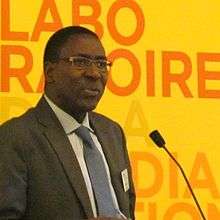Mamoudou Gazibo
Mamoudou Gazibo OON is a Nigerien political scientist. He is a professor of political science at the Université de Montréal. He studies comparative political institutions and democratisation across African countries.
Mamoudou Gazibo | |
|---|---|
 | |
| Nationality | Nigerien |
| Alma mater | Montesquieu University |
| Awards | Grand officier, Order of the Niger |
| Scientific career | |
| Fields | Political science |
| Institutions | Université de Montréal |
Education and positions
Gazibo attended Montesquieu University in Bordeaux, where he graduated in 1994 with a political science degree.[1] He continued to study there, and in 1995 completed a graduate diploma in political science, followed by a doctorate in political science in 1998.[1]
After finishing his doctorate, Gazibo became a post-doctoral researcher at the Université de Montréal.[1] In 2000, he joined the faculty of political science, first as an adjoint professor, and then in 2006 became a Professeur agrégé and in 2012 a Professeur titulaire (a full professor).[1]
Research
In 2005, Gazibo published the book Les paradoxes de la démocratisation en Afrique.[1] The book studies politics in African countries using a neo-institutionalist framework, focusing on how formal and informal rules constrain group and individual behaviour including through the presences of incentives and strategies.[2] Gazibo particularly focuses on the cases of Benin and Niger, and on the interaction between economics and politics.[3] Gazibo specifically investigates the determinants of democratisation, stressing the importance of incentive structures, political institutions, and economic conditions which are favourable to the emergence of democracy.[3]
In 2006, Gazibo wrote Introduction à la politique africaine, which is a textbook intended to introduce the study of African politics.[4] The book is divided into three sections: the first on methodology in African studies, the second on the structure of government, and the third on the challenges of governance.[4] Introduction à la politique africaine was reprinted in a second edition in 2010.[1]
Gazbio published the book Un nouvel ordre mondial made in China? with Roromme Chantal in 2011.[1] They study the history of political consolidation in China leading up to its development as a world power in industry and manufacturing.[5] They investigate the ramifications of this role in international politics, including China's military development and the creation of information warfare.[5] The book also concerns China's modern involvement in multilateral diplomacy.[5]
In 2009, Gazibo co-edited Le politique - Etat des debats et pistes de recherche with Céline Thiriot.[6] With Daniel C. Bach, Gazibo co-edited the 2011 book L'État néopatrimonial : genèse et trajectoires contemporaines and the 2012 book Neopatrimonialism Africa and Beyond.[1] In 2016, Gazibo and Muna Ndulo coauthored the book Growing Democracy in Africa: Elections, Accountable Governance, and Political Economy.[1]
From 2010 to 2011, Gazibo acted as a special counselor to the Prime Minister of Niger.[1] He was also the president of the comité des textes fondamentaux, responsible for drafting fundamental text for the 2010 Constitution of Niger.[1]
In 2011, Gazibo was named a Grand officier of the Order of the Niger.[1]
Gazibo has been interviewed, or his work has been covered, in media outlets including Jeune Afrique,[7] AllAfrica,[8] Radio France Internationale,[9] Le Devoir,[10] and Agence Ecofin.[11]
Selected works
- Les paradoxes de la démocratisation en Afrique (2005)
- Introduction à la politique africaine (2006; 2010)
- Un nouvel ordre mondial made in China?, with Roromme Chantal (2011)
Selected awards
- Grande officier, Order of the Niger (2010)[1]
References
- "Gazibo, Mamoudou" (in French). Université de Montréal. Retrieved 27 June 2020.
- Caro Martinez, Amalia (2005). "Les paradoxes de la démocratisation en Afrique". Afrique contemporaine (in French). 215 (3): 247. doi:10.3917/afco.215.0247.
- Laouisset, Djamel E. (1 January 2009). "Les paradoxes de la démocratisation en Afrique". Canadian Journal of African Studies / Revue Canadienne des Études Africaines (in French). 43 (3): 590–593.
- Ndiaye, Pap (March 2009). "Reviewed Work: Introduction à la politique africaine by Mamoudou Gazibo". Canadian Journal of Political Science / Revue canadienne de science politique (in French). 42 (1): 280–283.
- Lin, Ting-Sheng (June 2012). "Un nouvel ordre mondial made in China?". Canadian Journal of Political Science (in French). 45 (2): 485–486. doi:10.1017/S0008423912000650.
- "Le politique - Etat des debats et pistes de recherche, Gazibo et Thiriot". AllAfrica. 6 September 2010.
- Fualdes, Nelly (11 March 2018). "Un index de l'émergence « adapté aux réalités des économies africaines »". Jeune Afrique (in French). Retrieved 27 June 2020.
- Cheeseman, Nic (24 May 2020). "Africa: Compendium of New Research Celebrates African Solutions to National and Global Problems". AllAfrica (in French). Retrieved 27 June 2020.
- Correau, Laurent (18 May 2020). "Mamoudou Gazibo: repenser un «État social» incluant le monde rural et l'informel". Radio France Internationale (in French). Retrieved 27 June 2020.
- Boutros, Magdaline (6 April 2019). "Sortir un pays entier des ténèbres". Le Devoir (in French). Retrieved 27 June 2020.
- "Les pays africains classés selon le nouvel Indice de l'Emergence en Afrique 2017 (OBEMA)". Agence Ecofin (in French). 28 February 2018. Retrieved 27 June 2020.